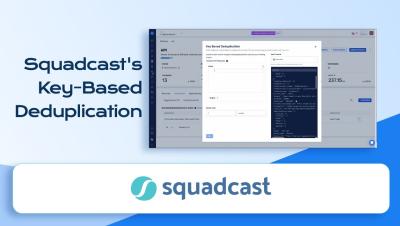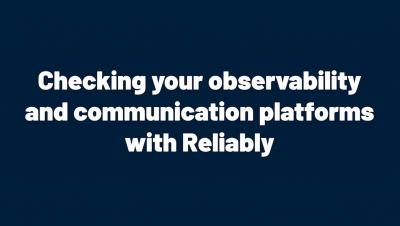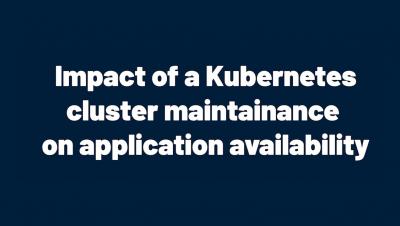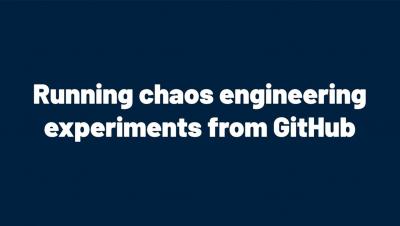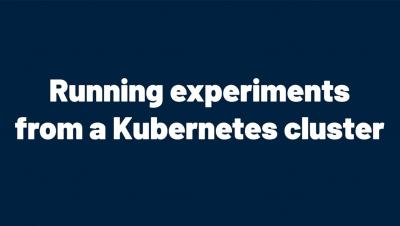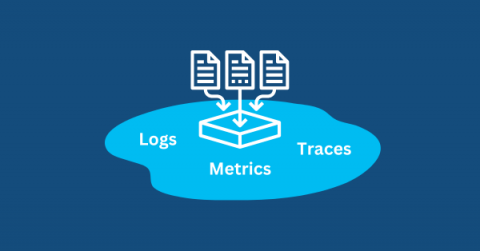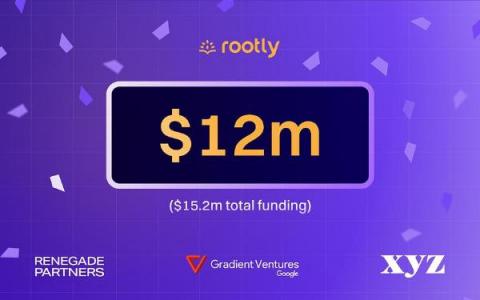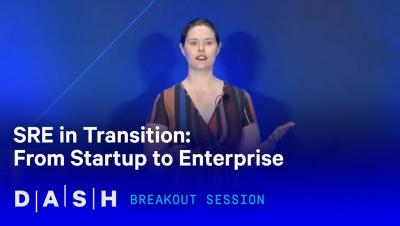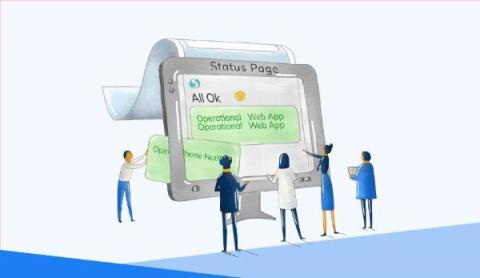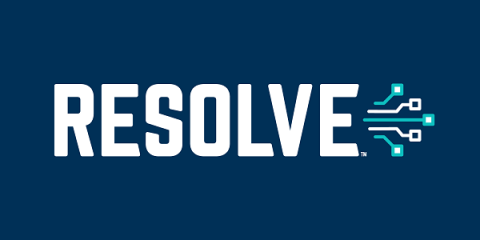Operations | Monitoring | ITSM | DevOps | Cloud
August 2023
Why Resilience Engineering Needs To Be A C-Level Strategy & How To Get There
The consequences of downtime and data breaches can be devastating to organizations, leading to substantial financial losses and irreparable damage to a business’s reputation. If last week's outage by the Bank of England is anything to go by, after losing trillions of £’s per day due to downtime, resilience shouldn’t just be an afterthought for organizations.
Latest Developments in Site Reliability Engineering, 2023
Gartner recently published its Hype Cycle for Site Reliability Engineering, 2023, (July 2023) report. OnPage was inspired by this report to share its prediction about the future of site reliability engineering. In this blog, OnPage will review evolutionary tools that can improve site reliability engineering practices.
Why the Blameless Mission Matters Today
Levitate - Last9's managed TSDB is now available on the AWS Marketplace
Levitate - Last9's managed TSDB is available on AWS Marketplace.
A Practical Guide to Incident Communication
Continuous Deployment vs. Delivery | Differences Explained
What is MTTR? The Different Meanings Explained
Incident Management KPIs | Choosing Metrics that Matter
How to use Key-Based Deduplication in Squadcast | Deduplication Rules | Squadcast
Helm Dry Run: Guide & Best Practices
Managing On-Call Rotations: Navigating Incident Management from Chaos to Calm
Navigating On-Call rotations can often feel like taming a storm of alerts and constant disruptions, leaving teams overwhelmed and stressed. Hence there is a need to streamline On-Call rotations and leverage concerned software to restore order and peace. In this guide, you'll explore practical tips, best practices, and smart strategies to transform your Incident Management process. Let's get to a more efficient On-Call experience.
PromQL Macros in Levitate
Define PromQL Macros to standardize complex PromQL queries in Levitate.
GCP Managed Service For Prometheus vs. Levitate
A detailed comparison of Levitate and Google Managed Prometheus - Cost, Scale and Ease of Use.
A case for Observability outside engineering teams
Observability is being built by engineers for engineers. In reality, o11y is for all.
We Need to Talk About the Hero Pattern Among SREs
Let’s be honest. When you see an alert pop up on your phone, you aren’t thinking “according to section 12 of our most recent SRE handbook used at training 6 months ago I need to keep in mind who should be Incident Commander and who should be Ops Lead”. You’re an engineer at heart.
The Iceberg of Engineering Incident Costs
Understanding the Rasmussen model for failures
What does the Rasmussen model teach us about Site Reliability Engineering?
Checking your observability and communication platforms with Reliably
#reliably #chaosengineering #honeycomb #slack #resilience
In this video, we will use a chaos engineering experiment, that we expect to fail, to verify our open tracing and communication platforms are correctly set up. Using the Honeycomb and Slack integrations provided by Reliably, we will send traces and messages and observe if they are triggered as expected.
10 Observability Tools in 2023: Features, Market Share and Choose the Right One for You
Understanding what's happening within your systems is a necessity. Have you ever wondered how experts keep an eye on systems to make sure everything's running smoothly? That's where observability tools come in! Observability tools are like helpers that give you a peek inside your tech. In this blog, we will talk about observability tools and how they can be used in different situations so it's easier for you to choose the right one for your organization.
Impact of Kubernetes cluster maintenance on application availability
#kubernetes #eks #chaosengineering
In this video, we will be exploring an interesting scenario that might happen in real life. Let's imagine we have an application running in a Kubernetes cluster inside EKS. If for any reason, two of our three nodes are cordoned and can't be scheduled anymore, what would happen to our users should the last node be cordoned as well? And what if we need to reschedule something?
An introduction to Reliably
#reliably #chaosengineering #resilience
In this video, we'll show how you can use starters and the Reliably cloud to get started very quickly.
Running an experiment in GitHub with Reliably
#reliably #chaosengineering #github #githubactions #resilience
Reliably lets you run experiments not only from the Reliably cloud but from your own environment. This video will focus on running a chaos engineering experiment in GitHub.
Running Reliably experiments from a Kubernetes cluster
#reliably #chaosengineering #resilience #kubernetes #k8s
Reliably lets you run experiments not only from the Reliably cloud but from your own environment. This video will focus on running a chaos engineering experiment in a Kubernetes cluster.
But It's Not Our Fault! When Third-party Incidents Affect Your Service
Very few SaaS products exist completely independently. Between cloud service providers, payment processors, content delivery networks, and more, chances are you rely on external systems to keep your product working. When these systems fail, it can leave you feeling pretty helpless. In some cases you might have fallback options, but oftentimes all you can do is wait for recovery and clean up the fallout.
How we tame High Cardinality by Sharding a stream
Using 'Sharding' to tame High Cardinality data for Levitate - Our Time Series Data Warehouse.
Azure Monitoring Agent: Key Features & Benefits
Splashing into Data Lakes: The Reservoir of Observability
How To Write Incident Postmortems
Writing a public postmortem regarding an outage is essential to maintaining transparency and accountability when things go wrong in a service or system. The purpose of writing a postmortem is to analyze and document an incident or event that has occurred, usually with a focus on identifying its root causes, understanding what went wrong, and outlining steps to prevent similar issues from happening in the future.
Rootly Raises $12 Million from Renegade Partners, Google Gradient Ventures, & XYZ Ventures
We are excited to announce that we have raised a $12M round of financing led by Renegade Partners with participation from Google Gradient Ventures (Google’s AI-focused venture fund) and XYZ Ventures. This brings our total funding to date to $15.2M ($20M CAD) alongside our other existing investors Y Combinator and 8VC.
SRE in Transition: From Startup to Enterprise
Tools and Trends in Site Reliability Engineering according to Gartner's 2023 Hype Cycle
Gartner recently published its Hype Cycle for Site Reliability Engineering, 2023, report. This blog reviews the future of site reliability engineering based on Gartner’s Hype Cycle. Additionally, the OnPage team is pleased that Gartner mentioned OnPage as a sample vendor in the Automated Incident Response category.
Thanos vs. VictoriaMetrics
A deep dive comparison between Thanos and VictoriaMetrics: Performance and Differences.
Observability vs. Telemetry vs. Monitoring
Observability vs Telemetry vs Monitoring - What they are, differences and what lies in future.
Evolution of Site Reliability - Incidentally Reliable with Manoj Sebastian
Unveiling Squadcast's Enhanced Status Pages
SRE Redefines IT Operations as Architect of Sustainable Systems
Site Reliability Engineering (SRE) is a term that’s getting attention and gaining momentum – and for a good reason. SRE takes features of software engineering and applies them to various problems in infrastructures and operations. Organizations look to build SRE teams with a couple goals in mind, including to create and increase scalability and develop solid software systems.
Kubernetes Incident Management Best Practices
Creating just any infrastructure on Kubernetes is not enough. There are so many basic configurations you could apply and create the infrastructure for your application for the time being and it might work just fine. The incident responses won’t always remain 100% reliable. You will run into newer potholes, and that’s okay.
Understanding Blameless Postmortems
Progress often accompanies unforeseen challenges and mishaps in organizations. Traditionally, these setbacks resulted in pointing fingers, hindering progress, and creating a negative work atmosphere. However, a "Blameless Postmortems" approach transforms how organizations respond to failure. In this blog, we will delve into the importance of cultivating a blameless postrmortem culture when faced with setbacks.











